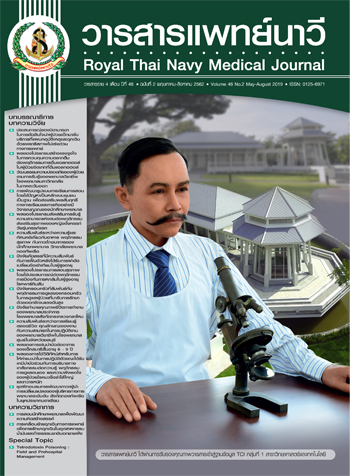Selected Factors Related to Postoperative Recovery in Older Person with Total Knee Arthroplasty
Main Article Content
Abstract
The purpose of this descriptive research was to study the postoperative recovery in older person with total knee arthroplasty and the relationships between selected factors relate to postoperative recovery in older person with total knee arthroplasty which were age, nutritional status, co-morbidity, anxiety, and social support at Orthopedic Department, Tertiary Hospital in Bangkok. Data were collected from 116 older persons who were selected with multi-stage sampling. Research instruments were personal information questionnaire, Geriatric Nutrition Risk Index, STAI Form X-I, Social support questionnaire and postoperative of recovery with total knee arthroplasty instrument. The reliability of STAI Form X-I, Social support questionnaire and postoperative of recovery with total knee arthroplasty instrument were 0.76, 0.90, and 0.86, respectively. Data were analysis by statistic methods, including mean, percentage, standard deviation, Pearson Correlation and Point Biserial Correlation. Major findings were as follows; 1) The recovery in older persons with total knee arthroplasty was at high level with 97.40 percent. 2) Age, anxiety and co-morbidity were negative significantly related to postoperative recovery in older persons with total knee arthroplasty at the level of .05 (r = -.506, -.532, and -.414, respectively). 3) Social support was positive significantly related to postoperative recovery in older person with total knee arthroplasty at the level of .05 (r = .193) and 4) Nutrition has not related to postoperative recovery in older person with total knee arthroplasty.
Suggestion: The results of this study, anxiety and social support factors, should be used for developing a post-operative recovery intervention for older persons with total knee arthroplasty.
Article Details

This work is licensed under a Creative Commons Attribution-NonCommercial-NoDerivatives 4.0 International License.
References
2. Prasartritha T. Osteoarthritis. Bangkok: Reanpunya printing; 2010. (in Thai).
3. Sattayawiwat W. Orthopidic nursing. 7th ed. Bangkok: NP Press; 2010 (in Thai).
4. Chareancholvanich K. Total knee arthroplasty. In: Nilkanuwong S. Rheumatism. 2th ed. Bangkok: NP Press; 2005. (in Thai).
5. Kurlowicz LH. Perceived self-efficacy, functional ability and depressive symptoms in older elective surgery patients. Nursing Research 1998;47(4):219-26.
6. Myles PS, Weitkamp B, Jones K, Melick J, Hensen S. Validity and reliability of a postoperative quality of recovery score: the QoR-40. Br J Anaesth 2000;84(1):11-5.
7. Tamnantong N. Rehabilitation clinical practice guideline. Bangkok: The Royal College of Physiatrists of Thailand; 2000. (in Thai).
8. Swangwatanasade O. Factors affecting the rehabilitation of quadriceps muscle in patients with osteoarthritis of knee. [Master’s Thesis, Faculty of Nursing]. Mahidol University; 1997. (in Thai).
9. Yimneum P. Factors related to health behaviors of the osteoarthritis patients post operation of total knee arthroplasty. [Master’s Thesis, Faculty of Education]. Kasetsart University; 2012 (in Thai).
10. Kaewmanee K, Sindhu S, Danaidutsadeekul S, Tanmahasamut P. Factors associated with quality of 24 hours post laparoscopic surgical recovery in benign gynecologic patients. Journal of Nursing Science 2013;31(3):48-56. (in Thai).
11. Sritan S. Factor predicting recovery in patients post abdominal surgery. Mahidol University; 2014. (in Thai).
12. Khamsiri N, Wanitkun N, Sindhu S, Bunburaphong P. The relationship between blood loss, systemic inflammatory response syndrome, blood glucose, pain, and recovery in patients during the first 12 hours after open heart surgery. Thai Journal of Cardio-Thoracic Nursing 2014;23(1):2-18. (in Thai).
13. Tonner PH, Kampen J, Scholz J. Pathophysiological changes in the elderly. Best Practice & Research Clinical Anaesthesiology 2003;17(2):163-77.
14. Dharmarajan TS, Unnikrishnan D, Dharmarajan L. Preparing the older adult for surgery.
Hospital Physician 2003;39(11):45-54.
15. Hoogeboom TJ, van Meeteren NL, Schank K, Kim RH, Miner T, Stevens-Lapsley JE. Risk factors for delayed inpatient functional recovery after total knee arthroplasty. BioMed Research International 2015:1-5. Article ID 167643.http://dx.doi.org/10.1155/2015/167643.
16. Summers MN, Haley WE, Reveille JD, AlarcOan GS. Radiographic assessment and psychologic variables as predictors of pain and functional impairment in osteoarthritis of the knee or hip. Arthritis & Rheumatism 1988;31(2):204-09.
17. Srisatidnarakul B. The medthodology in nursing research. 5th ed. Bangkok: U & I Intermedia; 2010. (in Thai).
18. Wangnum K. Factor related to self-care agency of older people with cancer receiving chemotherapy. [Master’s Thesis, Faculty of Nursing]. Chulalongkorn University; 2007. (in Thai).
19. Allvin R, Ehnfor M, Rawal N, Idvall E. Experiences of the postoperative recovery process: an interview study. Open Nurs J 2008;2:1–7.
20. Jiaepoemsuk P, Ua-kit N. Selected factors associated with recovery among post coronary artery bypass graft patient. Royal Thai Navy Medical Journal 2018;45(1):66-84. (in Thai).
21. Amin AK, Patton JT, Cook RE, Brenkel IJ, Does obesity influence the clinical outcome at five years following total knee replacement for osteoarthritis?. Bone & Joint Journal 2006;88(3):335-40.


